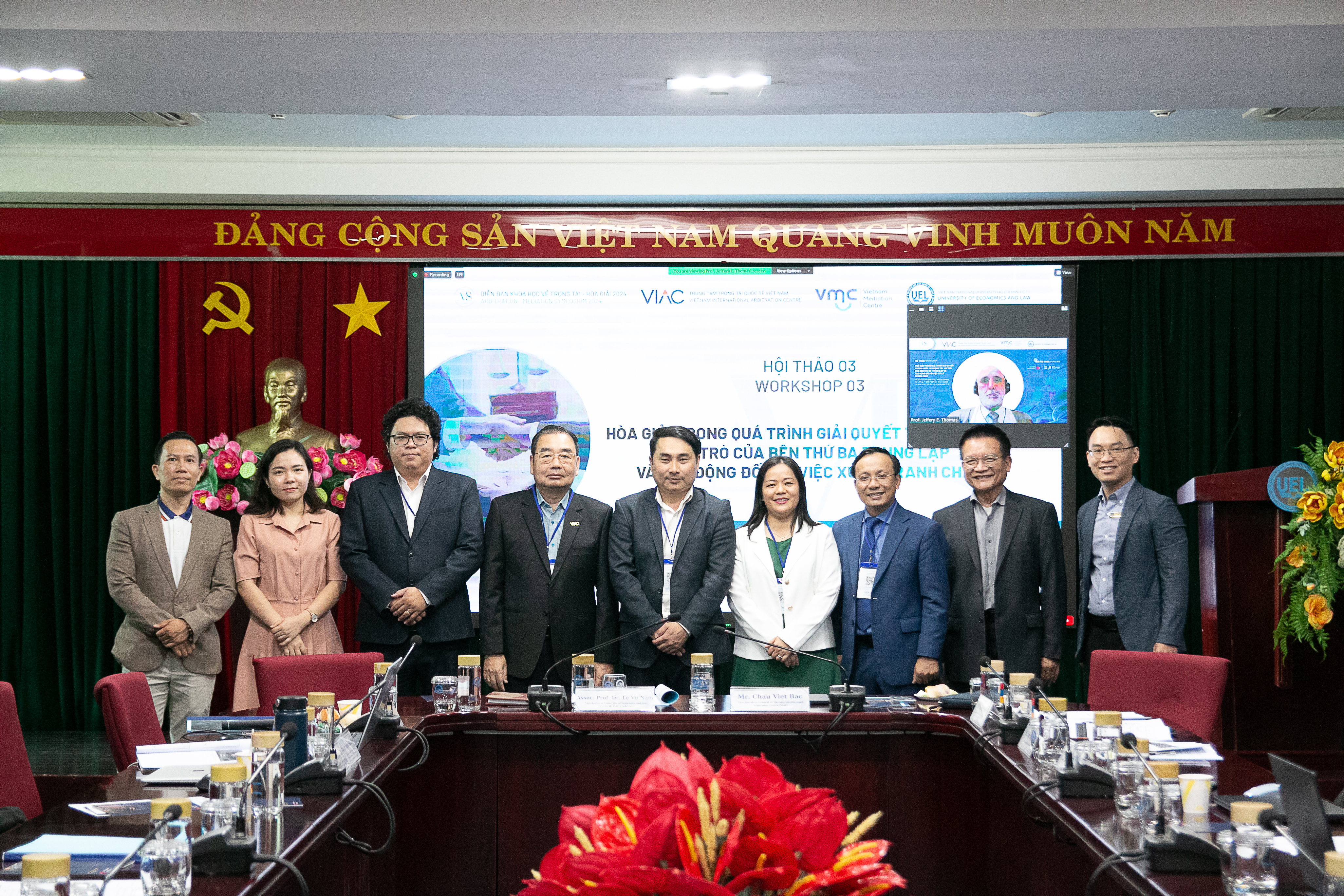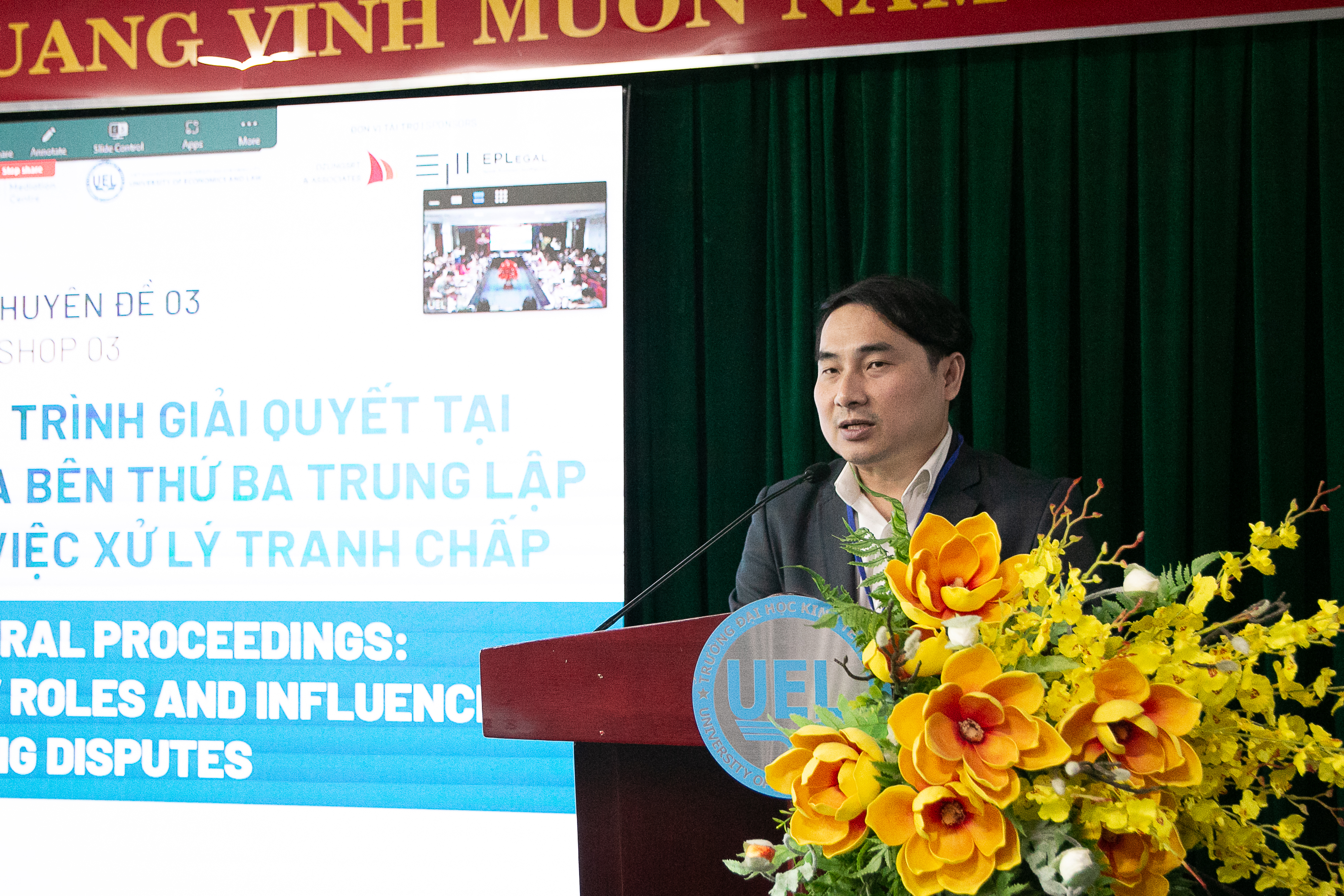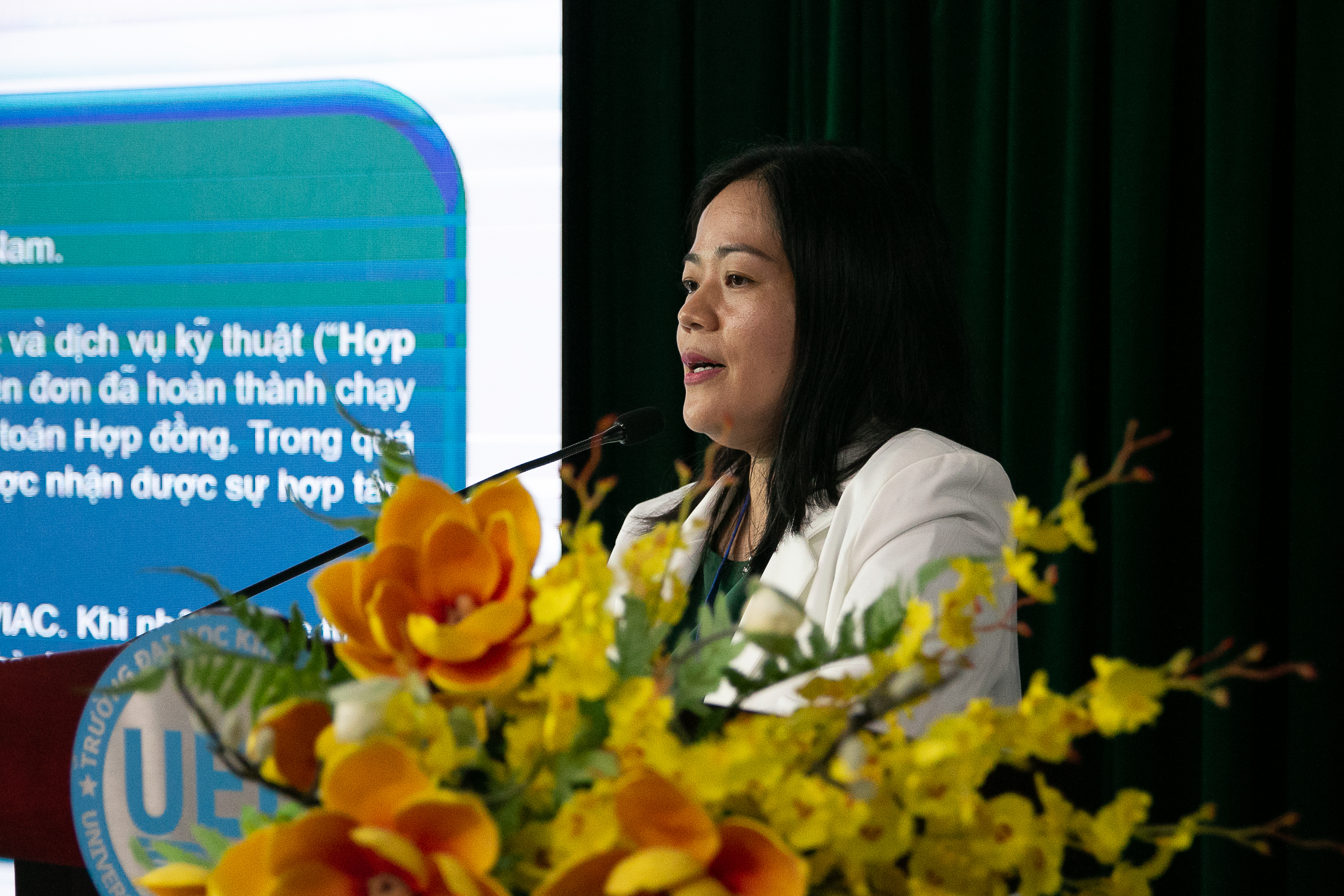
Experts participating in the workshop
On April 5, 2024, in Ho Chi Minh City, the Vietnam International Arbitration Centre (VIAC) and the Vietnam Mediation Centre (VMC), in collaboration with the University of Economics and Law, Vietnam National University - Ho Chi Minh City (UEL), organized the workshop on “Mediation in arbitral proceedings: Neutral third parties’ roles and influences on resolving disputes”. This is the third workshop within the framework of the Arbitration - Mediation Symposium 2024 - AMS 2024 (Vietnamese title: Diễn đàn khoa học về Trọng tài – Hòa giải 2024), focusing on the main topic of “Third parties and influences on arbitral proceedings” taking place from March 22, 2024 to April 11, 2024, organized by the Vietnam International Arbitration Center (VIAC) collaborating with law training institutions and other partners. The event was successful, attracting over 100 delegates attending in person and nearly 150 online participants.

Assoc. Prof. Dr. Le Vu Nam - Vice-Rector, University of Economics and Law, Vietnam National University Ho Chi Minh City (UEL)
Assoc. Prof. Dr. Le Vu Nam - Vice-Rector, University of Economics and Law, Vietnam National University Ho Chi Minh City, delivered the opening speech for the workshop. According to Mr. Nam, mediation, arbitration, and alternative dispute resolution (ADRs) methods in general have gradually gained a foothold and are increasingly being chosen by many businesses. However, some guidelines regarding arbitration procedures and the mechanism for resolving disputes by arbitration-mediation are still incomplete, causing many difficulties for the Arbitral Tribunal. Mr. Nam explained that currently, according to the LCA 2010, during the arbitral proceedings, the parties can either mediate themselves or request the Arbitral Tribunal to mediate. This provision facilitates the parties in resolving disputes amicably while also helping to reduce the burden of costs. On the other hand, during the dispute resolution process, arbitrators are required to be neutral, impartial, and objective to ensure that disputes are resolved fairly and transparently. Thus, with the aim of clarifying theoretical foundations and making recommendations related to this topic, Mr. Nam hopes the workshop will provide valuable information. Additionally, organizing this workshop also demonstrates the effective and goodwill cooperation spirit between the Vietnam International Arbitration Centre (VIAC) and the University of Economics and Law, Vietnam National University Ho Chi Minh City (UEL).

Mr. Chau Viet Bac, Deputy Secretary-General of VIAC
Representing the Vietnam International Arbitration Centre (VIAC), Mr. Chau Viet Bac, Deputy Secretary-General of VIAC, also shared practical insights at the workshop. Known as a “comprehensive” and “friendly” dispute resolution method, mediation is always encouraged. Unlike negotiation, mediation requires a neutral third party—the “mediator”—to facilitate the parties in reaching a successful agreement. However, the effectiveness of mediation depends on many factors, the most important of which is the legal framework that lays the basis for the conduct of mediation, the value of the mediated settlement agreement, etc. In addition to commercial mediation, the mediation, which is applied as a procedure in arbitration, is also a noteworthy issue. The LCA 2010 permits this, and while it is not mandatory, practical experience at VIAC also shows that the Arbitral Tribunal is willing to facilitate the parties in mediation.

Dr. Le Nguyen Gia Thien – Vice Dean of School of Law, Research Director of Institute of International and Comparative Law, University of Economics and Law, VNU-HCM
At the workshop, Dr. Le Nguyen Gia Thien presented on mediation activities primarily before the constitution of an Arbitral Tribunal, which focuses on the Parties’ agreement and the role of the “Mediator”. Dispute resolution methods aside from the Court include negotiation, mediation, and arbitration, along with dispute resolution mechanisms through Dispute Resolution Boards in construction contracts or through expert determination. In practice, it is essential to clearly distinguish these methods, as the role of the “third party” in arbitral proceedings and mediation process is entirely different. Arbitrators serve as judges who evaluate and render decisions based on the arguments and evidence provided by the parties. In contrast, mediators listen and strive to reconcile the parties through reasonable and fair analysis and settlement. Furthermore, he noted that currently, arbitral awards hold the same value as court judgments, whereas mediation agreements are essentially contracts between the parties.
Mr. Pham Quoc Tuan - Managing Partner at DIMAC Law Firm, Arbitrator at VIAC, Mediator at VMC
Following Dr. Le Nguyen Gia Thien's presentation, to provide additional information about the mediation process in the arbitral proceeding from a practical perspective, Mr. Pham Quoc Tuan - Managing Partner at DIMAC Law Firm, Arbitrator at VIAC, Mediator at VMC, also presented at the workshop on the topic “Practices of the procedures for mediation in arbitral proceedings: Potential conflicts and recommendations for the tribunal’s directions.” Mr. Tuan listed several potential conflicts that may arise during the mediation process in dispute resolution hearings, such as: (i) the Arbitral Tribunal providing detailed guidelines or suggestions to facilitate mediation, leading the parties to misunderstand that the Arbitral Tribunal has a stance on the outcome of the dispute, even though the opinions of the arbitrators or the Arbitral Tribunal are merely preliminary conclusions; (ii) arbitrators taking on the role of mediators and/or applying procedures similar to those for commercial mediation; (iii) the Arbitral Tribunal excessively promoting mediation, even in cases where one of the parties requests not to mediate and wishes to continue resolving the dispute through arbitration. These arising issues can hinder the dispute resolution process for the parties; therefore, Mr. Tuan recommends that the Arbitral Tribunal carefully consider conflicts by thoroughly reviewing and being cautious regarding the role conflicts of “arbitrator” and “mediator”.
Professor Jeffrey E. Thomas - Associate Dean for Strategic Initiatives & Graduate Programs, Professor of Law, the Daniel L. Brenner Faculty Scholar at the University of Missouri – Kansas City (UMKC), participating online
From an international experience perspective, Professor Jeffrey E. Thomas shared insights on some mediation - arbitration models currently used worldwide with his presentation “International approach: Proceedings of concurrent mediation - arbitration and recommendations for applying this provision”. Like many countries around the world, arbitration and mediation are very popular in the United States, even in some states, mediation is mandatory. The mediation process can be initiated at any time with the parties’ consent; however, the operational effectiveness of running arbitration and mediation processes concurrently to save time for the parties, as well as the pros and cons of this approach, needs further study. Essentially, if the parties agree to have the arbitrator also serve as the mediator, this can occur, but it significantly affects the confidentiality and objectivity of the arbitrator, as the skills of an arbitrator and a mediator are entirely different.

Ms Ngo Quynh Anh – Senior Partner and Deputy Managing Partner at Dentons LuatViet
Ms Ngo Quynh Anh presented at the workshop on the topic “Recommendations for regulations on mediating in the arbitral proceedings and notes about changing dispute resolution methods”. According to Ms. Quynh Anh, among all combined dispute resolution methods, the combination of arbitration and mediation is the most common. These two methods share several similarities, such as high confidentiality, flexibility, and the presence of a neutral third party in resolving disputes. The combined dispute resolution methods include three main groups: Mediation-Arbitration (“Med-Arb”), Arbitration-Mediation (“Arb-Med”), and Arbitration-Mediation-Arbitration (“Arb-Med-Arb”). Currently, while mediation in arbitral proceedings is a mixed dispute resolution method with development potential and is being implemented at some centers, the lack of specific legal regulations and practical cases has led to many difficulties in applying this method. Therefore, Ms. Quynh Anh emphasized the necessity for clear, well-considered guidelines with good forecasting and legal provisions in future regulations on arbitration.

After the presentations by the experts, a comprehensive discussion moderated by Assoc. Prof. Dr. Le Vu Nam - Vice-Rector, University of Economics and Law, Vietnam National University Ho Chi Minh City (UEL), Arbitrator at VIAC, and Mr. Luong Van Ly – Senior Advisor at GV Lawyers, Arbitrator at VIAC, took place with many questions raised by the attending delegates along with thorough exchanges and valuable information shared by experts and guests.
----------------------------------------------
Event Materials: Please view HERE